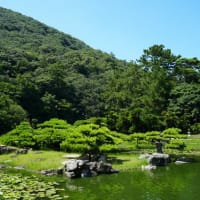A reader of this column posted a photo of the facial features of Tedros of WHO and Omura, the governor of Aichi Prefecture, which are very similar.
Nevertheless, the history of China's domination of the WHO and the WHO's words and actions from the outbreak of the Wuhan virus up to the present are the very essence of provincial theatrical performance.
The Sankei Shimbun is the most decent newspaper not only in Japan but in the world today.
The following is from an article that appeared in today's Sankei Shimbun under the title 'China lures in aid to seize WHO.'
This article is accurate reporting, written by a real journalist.
On the other hand, NHK and other T.V. media are not only reporting on the situation but also revealing that it is under Chinese control just like WHO.
China is targeting international organizations that the U.S. has no interest in.
China was quietly infiltrating critical positions in international organizations.
It was the moves over new coronavirus of WHO that made us realize this reality.
Praise for China's anti-epidemic response
On January 28, the focus was on whether the WHO would declare a 'public health emergency of international concern.'
WHO Director-General Tedros flew to Beijing to meet with President Xi Jinping, and he said.
'We don't often see the kind of swift, large-scale action that China has. It shows the efficiency of China and the strength of its system.'
The WHO rejected the declaration of a state of emergency at an emergency committee meeting on January 23, saying it was "premature.
He finally issued a declaration on January 30 but did not recommend any travel restrictions.
It wasn't until March 11 that I expressed my awareness of a "pandemic" (a global pandemic).
As of January, the WHO had downplayed the possibility of human-to-human transmission and insisted that a travel ban was not necessary.
Tedros went on to praise China's response, which included blockading the city of Wuhan in Hubei province, the source of the virus outbreak.
In a speech on March 11, U.S. Assistant to the President for National Security Affairs O'Brien accused China of conducting "cover-up activities" when the virus was first confirmed and of "delaying the response of countries around the world by two months.
The U.S. and other nations have strengthened their view that WHO is complicit in China; it has allowed the infection to spread around the world.
Tedros' country of origin, Ethiopia, is considered a model nation for China's "One Belt, One Road" plan for a vast economic zone, and will receive huge infrastructure investment from China in the form of railways and power supplies.
China carried Mr. Tedros, who had emphasized the importance of "cooperation with China" in the 2017 election for the WHO director-general.
It is a significant reason why the WHO's response was so late in the fight against the virus, which is considered the biggest crisis since World War II.
The core of the international organization, the United Nations, was conceived at the initiative of the United States during World War II.
Led by U.S. Secretary of State Hull, a draft of the UN Charter was drawn up, which was then fleshed out through coordination between the US, Britain, China, and the Soviet Union.
In line with the U.S. policy of dealing not only with collective security but also with global economic and social issues, a succession of specialized organizations were established, which became the foundation of the postwar world order.
The World Health Organization (WHO), one of these organizations, had its first executive director from China in 2007. Margaret Chan from Hong Kong = Photo.
It is where China's foray into international organizations began.
In 2015, the World Health Organization (WHO) established a rule not to include place names in the naming of infectious diseases when naming the Middle East Respiratory Syndrome (MERS) in response to a growing concern about the disease.
That's the basis for China's objection to the U.S. now referring to the new corona as the "Wuhan virus" and so on.
The movement to exclude Taiwan has also intensified in line with China's claim of "One China."
Since 2017, Taiwan has not been invited to the WHO General Assembly, even as an observer.
Originally a member of the United Nations as the Republic of China, Taiwan has become a blank slate in the world's public health field.
Rule-making initiative
International organizations can be broadly divided into two categories: those that focus on on-field activities, such as helping the poor, and those that focus on rule and norm-making. Recently, China has taken an interest in the latter and is approaching it.
A former diplomat with knowledge of international organizations explains.
What China specifically targeted was an institution that the United States and others have shown little interest in. Elections by member states to determine the head of their institutions, drawing African countries in with the bait of economic support, and electing candidates close to China and China.
Besides, they will have a stronger voice by making voluntary contributions as well as paying their share to run the organization.
China currently occupies the top spot in four of the 15 U.N. specialized agencies.
He has conquered the fortresses built mainly in the United States one by one and is expanding his own "norms."
If we are headed for a Chinese-led world rule, which Mr. Xi calls the "Community of Human Destiny," then it is a grave threat to the democratic camp.
WHO's a most significant contributor, the US, has embarked on to be exasperated, drastic measures.
In April, the Trump administration said it would verify WHO's management over the new corona and declared that it would suspend contributions in the meantime.
If the organization is not functioning, the United States will work with its partners to create a framework, form, and governance model that will enable it to realize its original objectives.
Secretary of State Pompeo said on his radio program on April 23, even mentioning the possibility of setting up another international health organization.
It remains to be seen what reforms the U.S.-pushed NOTICE will bring to international organizations.
However, there is no doubt that the new corona that has struck the world has further strengthened the resolve of the United States to fight authoritarianism.
(Nagato Masako, Washington, Etsunari Kurose, Mina Mitsui, Paris.)
最新の画像[もっと見る]
-
 Coldplay - A Sky Full of Stars (Glastonbury 2024) with my shots on 2024/7/22 in Kagawa
2時間前
Coldplay - A Sky Full of Stars (Glastonbury 2024) with my shots on 2024/7/22 in Kagawa
2時間前
-
 Coldplay - Fix You (Glastonbury 2024) with my shot on 2022/7/25 in Kyoto
2時間前
Coldplay - Fix You (Glastonbury 2024) with my shot on 2022/7/25 in Kyoto
2時間前
-
![Coldplay - Don't Look Back in Anger [LIVE MANCHESTER] with my shot on 2024/7/22](https://blogimg.goo.ne.jp/image/upload/f_auto,q_auto,t_image_square_m/v1/user_image/5d/2f/8001cf42515c3bf48c7130b677a55854.jpg) Coldplay - Don't Look Back in Anger [LIVE MANCHESTER] with my shot on 2024/7/22
2時間前
Coldplay - Don't Look Back in Anger [LIVE MANCHESTER] with my shot on 2024/7/22
2時間前
-
 Golden Slumbers (2019 Mix) with my shot on 2022/7/25, in Kyoto
2時間前
Golden Slumbers (2019 Mix) with my shot on 2022/7/25, in Kyoto
2時間前
-
 For No One (2022 Mix) with my shot on 20227/25 in Kyoto
3時間前
For No One (2022 Mix) with my shot on 20227/25 in Kyoto
3時間前
-
 The most admirable person is who invented the URL and provided it for free.
3時間前
The most admirable person is who invented the URL and provided it for free.
3時間前
-
 These are the top 10 popular pages in real-time. 2024/7/24, 22:49
4時間前
These are the top 10 popular pages in real-time. 2024/7/24, 22:49
4時間前
-
 Vyhláste svetu, že fašizmus nie je v 21. storočí potrebný.
12時間前
Vyhláste svetu, že fašizmus nie je v 21. storočí potrebný.
12時間前
-
 Pasludiniet pasaulei, ka fašisms 21. gadsimtā nav vajadzīgs.
12時間前
Pasludiniet pasaulei, ka fašisms 21. gadsimtā nav vajadzīgs.
12時間前
-
 Isytiharkan kepada dunia bahawa fasisme tidak diperlukan pada abad ke-21.
12時間前
Isytiharkan kepada dunia bahawa fasisme tidak diperlukan pada abad ke-21.
12時間前









